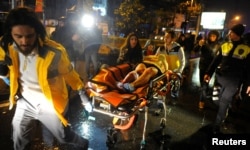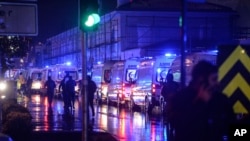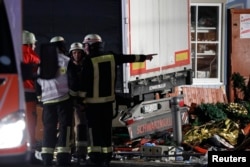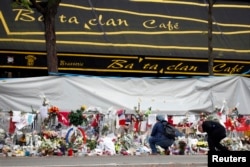An hour into the new year and shocked first responders were counting bodies in a nightclub on the coast of Istanbul’s Bosphorus.
The 39 dead and the dozens wounded had come to celebrate the arrival of 2017 but already, thanks to a lone gunman, this year appears set to be a bloody repeat of 2016 for Turkey.
Terror attacks have come right on top of each other in the country in an accelerating succession of bombings and shootings.
Last month alone saw 44 people killed and 163 wounded in a twin bomb attack on a football stadium in Istanbul. Just 11 days ago in the country’s capital, Ankara, the Russian ambassador was gunned down by an off-duty policeman who announced the slaying was in protest at Russia’s indiscriminate bombing of Syrian rebels and civilians in eastern Aleppo.
Since July 2015 more than 500 people have died in Turkey in terror attacks claimed either by the Islamic State terror group or Kurdish separatists. Eight IS members were detained last week suspected of preparing a suicide attack for New Year's Eve.
Few security experts doubt the killing on Saturday night is somehow linked to the Islamic State terror group. While Kurdish separatists tend to target Turkish soldiers whether they are on or off duty, the only discernible pattern in who is targeted by jihadists is that there is no pattern. It is the ‘where’ that’s important, say counter-terror experts.
IN PICTURES: Istanbul Nightclub New Year's Eve Terror Attack
The killing zones are crowded venues so the casualty tally has the potential to be high — the same holds true in Europe and North Africa as in Turkey.
Sad list
Istanbul’s Reina night club joins a sad list: The Tunisian resort of Sousse, where Western vacationers were slaughtered by a lone gunman who at first looked like just another beachcomber going for a stroll, kicking up some spray by the Mediterranean’s edge before unleashing his mayhem. Nice’s promenade, where French revelers celebrating Bastille Day were plowed into by a speeding truck. Paris’ Bataclan theater where 89 concert-goers were killed by suicide bombers.
And last month a Christmas marketplace in Berlin, where again a speeding truck was the weapon of choice for the mass murder of innocents.
The targets couldn’t be much softer. The terror attacks are not incidents in battlefield action with bombs and bullets flying — they involve, as with the Reina nightclub slaughter, the methodical killing of unarmed victims who are often partying or relaxing and are utterly vulnerable.
With rare exceptions, such as the Bataclan assault, spectacular 9/11 attacks that require some ingenuity, planning and training for months even years are currently being eschewed by jihadists. What we have is the shocking targeting of the easiest, most vulnerable victims and in the least challenging circumstances for the assailants.
One of the reasons for the so-called soft targeting is that improved security and greater vigilance is making it harder for more complex terror plots to be executed, analysts say. But even improved security is not full-proof.
Enhanced security
In the hours after the massacre at the Reina, one of Istanbul’s best-known nightclubs, popular with locals and tourists alike and frequented by businessmen and diplomats, security analysts were questioning the ease with which the gunman was able to arrive in a taxi armed with an automatic weapon.
Security had been beefed up in Istanbul for the New Year celebrations. There were 25,000 policemen on duty in Istanbul on Saturday night and the gunman’s taxi passed through three nearby security checkpoints to reach the club. The gunman, after spraying bullets in the crowded club that was hosting up to 800 people, had no difficulty in making good his escape.
Turkish commentator Murat Yetkin questions the competence of the police and security officials who have been replacing those purged by the government in the wake of the botched coup in July to unseat President Recep Tayyip Erdoğan.
“There have recently been a number of warnings sent to provincial governors that major terrorist attacks are expected in big cities, especially in Istanbul and Ankara, focused on crowded places like shopping malls, restaurants and nightclubs frequented by foreign nationals and tourists. If there is a failure, the precautions side of security should now be debated,” he argues.
The attack has not only exposed possible Turkish security failings as the country experiences the mounting backlash of the conflict in neighboring Syria. It is also prompting questions about the effectiveness President Erdogan’s autocratic style of governing. “In times of crisis when violence stalks the land people cry out for a strongman to get a grip on the problem. But what if terrorism spawns chaos in a country already under the thumb of a strong man?” queries Mark Almond, an Oxford University historian and author of “Secular Turkey: A Short History.”
Security challenges
“Turkey is in a uniquely awful position. It now has the strongest president since the military coup in 1980, possibly since Ataturk himself ninety years ago. But President Erdogan’s extraordinary skill in consolidating his power has not been matched by an ability to solve the country’s problems,” Almond said.
Those problems could worsen in the coming months as jihadists lose more territory in Syria and Iraq and vent their fury on Turkey. But it is not only Turkey that has been put on notice by Saturday’s attack that 2017 will likely continue in much the same way as 2016.
British security minister Ben Wallace warned hours before the Reina attack that Islamic State wants to carry out a mass casualty attack in Britain and has “no moral barrier” to using chemical weapons.
“They want to harm as many people as possible and terrorize as many people as possible.They have no moral objection to using chemical weapons against populations and if they could, they would in this country,” Wallace told Britain's Times newspaper, adding, "The casualty figures which could be involved would be everybody's worst fear.”









